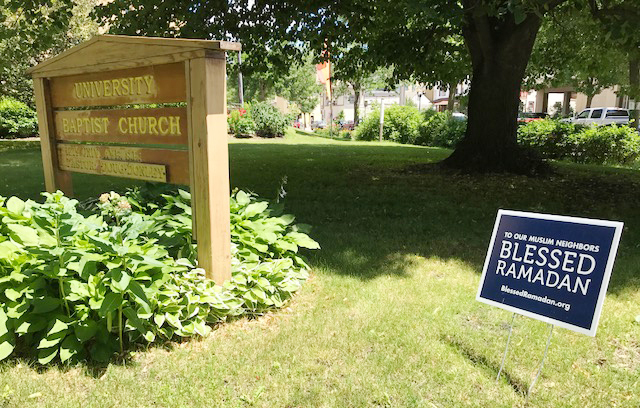 Within a mile of University Baptist Church sits the largest community of Somali immigrants in the United States. Distinct in their hijabs and elegant robes, their lives can’t help but intersect ours. When a fire destroyed a mosque in the neighborhood, we joined with other churches to offer them space for worship and respite. The community has made some inroads in electoral politics, a few even rising to city and state offices. But for all of the mainstreaming presence, they face increased discrimination. On his one campaign stop in Minnesota, then-candidate Donald Trump decried the Somali and Muslim presence as a sign of the degradation of our society.
Within a mile of University Baptist Church sits the largest community of Somali immigrants in the United States. Distinct in their hijabs and elegant robes, their lives can’t help but intersect ours. When a fire destroyed a mosque in the neighborhood, we joined with other churches to offer them space for worship and respite. The community has made some inroads in electoral politics, a few even rising to city and state offices. But for all of the mainstreaming presence, they face increased discrimination. On his one campaign stop in Minnesota, then-candidate Donald Trump decried the Somali and Muslim presence as a sign of the degradation of our society.
A travel ban and a cap on refugee immigration followed and now the Muslim community faces even more challenges going forward. So our congregation struggled to find the best way to accompany our Muslim sisters and brothers. We also realized that we were rather ignorant of the lives and beliefs of our Muslim neighbors.
 During the period between Holy Week and Ramadan, we held a seven-week intensive study entitled, “My Neighbor is Muslim.” We adapted a curriculum used across the country for people wishing to break down barriers of misinformation and diversity. Members of the local Islamic community led our sessions. We were invited to leave our assumptions at the door and be open to learn. About a quarter of our church completed the course. Three of the sessions were held at a mosque. We prayed alongside our new friends at their mosque. We donned headscarves and removed our shoes in respect. When they invited us to join them for dinner during Ramadan — the sun goes down after 9 p.m. in a Minnesota June — those who had not eaten in more than 16 hours insisted that we eat first. I for one saw a hospitality reminiscent of Pentecost.
During the period between Holy Week and Ramadan, we held a seven-week intensive study entitled, “My Neighbor is Muslim.” We adapted a curriculum used across the country for people wishing to break down barriers of misinformation and diversity. Members of the local Islamic community led our sessions. We were invited to leave our assumptions at the door and be open to learn. About a quarter of our church completed the course. Three of the sessions were held at a mosque. We prayed alongside our new friends at their mosque. We donned headscarves and removed our shoes in respect. When they invited us to join them for dinner during Ramadan — the sun goes down after 9 p.m. in a Minnesota June — those who had not eaten in more than 16 hours insisted that we eat first. I for one saw a hospitality reminiscent of Pentecost.
What did we learn? Like Christianity and Judaism, it’s a monotheistic religion that is marked by a lifestyle of prayer (five times a day). It’s no more violent a religion than Christianity or Judaism. The scripture we share after all is laced with violence and hope. One of the takeaway lessons from the month is the statement that ISIS is to Islam as the KKK is to Christianity. True Muslims seek peace, understanding and living in community with their neighbors. This is true with all of the Muslims I have met. Muslims hold Jesus and Mary in high regard.
We learned that when Muslims pray, they stand shoulder to shoulder, rich and poor, of whatever language and nationality. They are to stand touching shoulders so there is no room for the devil to get in between you and your prayer partner. Imagine if we Christians did this?
Now it is our turn to take these lessons and put them into practice. We are committed to seeing our Muslim friends as sisters and brothers. Just as Baptists don’t like to be stereotyped, we will not only resist, but actively oppose the tendency to make sweeping generalizations about Muslims. Of all people, Baptists who were on the receiving end of religious persecution ought to be the greatest advocates for welcoming those who are persecuted.
We are thankful for the generous and thoughtful welcome of our Muslim sisters and brothers. We are committed to responding in kind.
